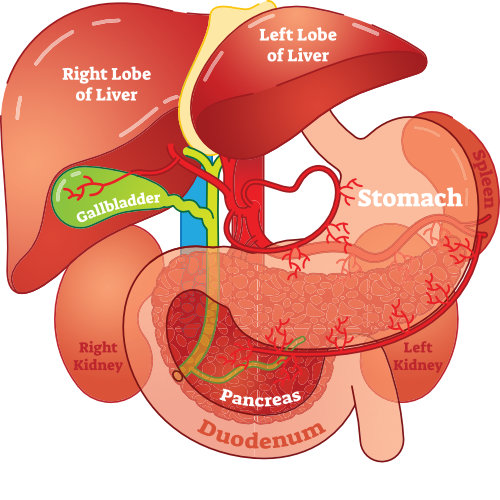Gallbladder surgery or cholecystectomy for gallstones is one of the more frequent general surgeries performed in the united States. The gallbladder is responsible for storing the bile produced by the liver. The gallbladder then releases the bile into the intestine when it is needed to break down fats during digestion. This bile travels from the gallbladder to the intestines through a bile duct.

In some cases, the bile that is stored in the gallbladder can thicken and form gallstones. Gallstones are small, hard masses of cholesterol and bile salts and can be very painful. In other instances, the gallbladder can stop functioning properly and need to be removed. Gallblader surgery is used to treat both a dysfunction, or “dyskenetic” gallbladder, and gallstones.
Gallbladder surgery
A laparoscopic cholecystectomy is a minimally invasive Gallbladder surgery used to remove the gallbladder. Dr. Bass makes several small incisions around the gallbladder and then inserts a long, flexible tube with a light and a camera on the end. Special surgical instruments are then inserted into the incisions and the procedure is performed with the surgeon watching the operation on a monitor connected to the camera.
If you develop gallstones or your gallbladder becomes dysfunctional, your doctor may recommend gallbladder surgery to treat you.
Gallstones
Symptoms and Treatments for Gallstones
On the upper right side of your body, just under your liver, lies your gallbladder. Fluids made by the liver that aid in digestion are stored by the gallbladder. At times, these digestive fluids become solid and form stones, which are called gallstones.
Sometimes gallstones do not cause symptoms. At other times, they can cause a number of symptoms, including pain. If gallstones leave the gallbladder through the passage to the intestines, sometimes they get stuck and may block the passageway. When this happens, you may experience severe pain in your upper right side, and even in your upper back. The pain may last for a number of hours. This is often referred to as a gallbladder attack.
A partial or complete blockage can cause your gallbladder to become irritated and inflamed. In addition to pain for a few hours, you may also spike a fever. Nausea is often present and you may even vomit. Additionally, your skin may turn a yellowish color, which is called jaundice.
Not everyone will get gallstones, but you are more likely to get them if you are pregnant, over 60 years of age or have diabetes. Women are more likely to experience gallstones than men as are overweight and obese individuals. People that are of Mexican or American Indian decent are also more likely to get gallstones. Taking birth control pills and eating a high cholesterol diet increases your chances of getting gallstones. As with some other diseases, having a family history of gallstones increases your risk of experiencing them. Lastly, if you recently lost weight rapidly and are on a low-calorie diet, you may get gallstones.
If you have gallstones, but they don’t cause you pain, your Ft. Myers, Florida doctor may advise to just let them be. On the other hand, treatment is usually advised for gallstones that cause pain. Evidence indicates that if you have had one gallbladder attack, you have about a 70 percent chance of having another one. In cases where a gallbladder attack results in an inflamed or irritated gallbladder, your physician may suggest that you have Gallbladder surgery to remove your gallbladder right away. Without removing an inflamed gallbladder, there is a chance that the gallbladder may become infected and even burst.
For individuals who have lung disease, heart problems or other high-risk surgery factors, there are less invasive procedures that can be performed to treat gallstones. These include sound wave therapy, which breaks up stones so they can move to the intestine without causing a blockage. Although it doesn’t work for everyone, there is also a pill that can be taken to dissolve stones. Keep in mind than many gallstones return with these less invasive medical procedures. Gallbladder removal surgery is still the most effective way to cure gallstones.

